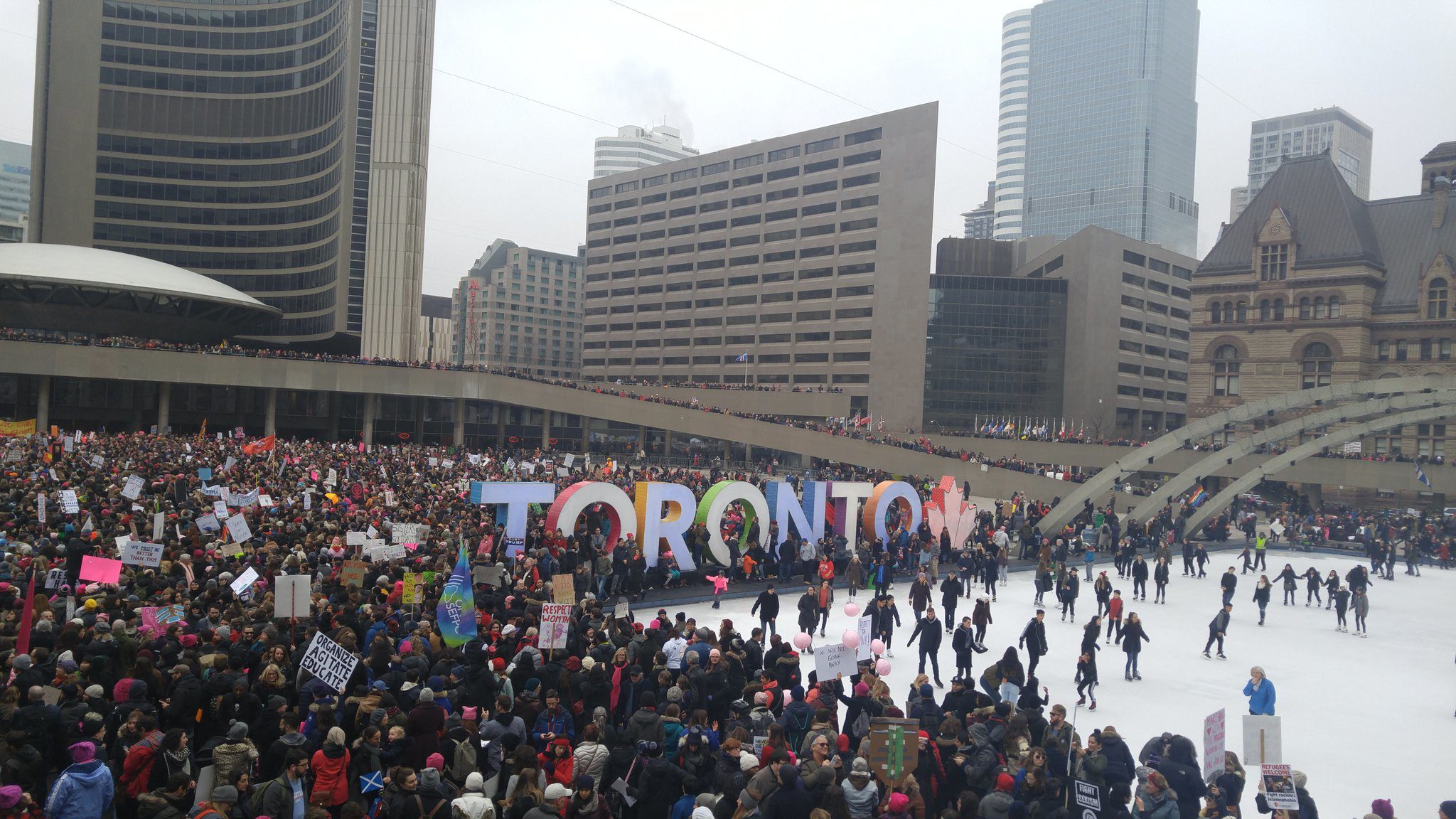Drawing a line between the personal and the professional when it comes to protest
This story was funded by the J-Source Patreon campaign
By Katrina Clarke
I didn’t march.
When tens of thousands of people packed the streets of Toronto for the Women’s March on January 21, I wasn’t there. Not because I don’t support women’s rights, LGBTQ rights or reproductive rights, but because, as a journalist, I knew my participation in a protest would be frowned upon in traditional journalism circles, and that many media outlets, including some I freelance for, prohibit such acts.
Things get murky when journalists try to draw an ethical line between holding personal beliefs and publicly expressing them.
And in the age of Twitter and Trump, some journalism ethics experts stress that now, perhaps more than ever, journalists need to be seen as impartial in an effort to ward off being labeled biased or “fake news.” But others see this as a potential tipping point — a time when journalists will demand access to their rights to freedom of personal expression, forcing newsrooms to revise their policies in favour of full-disclosure, letting reporters protest and speak their minds freely.
Journalism ethics today
“It is a pretty basic understanding now that nobody is objective,” said Ivor Shapiro, a professor at the Ryerson School of Journalism. “Whether they’re a journalist or a garbage picker-up, they come to their work as human being with their perspectives, backgrounds, beliefs and desires.”
Shapiro believes journalists can hold private opinions on political issues, and still remain independent and disciplined in their reporting. He gives the example of other professionals such as doctors who oppose abortion, but still refer their patients for the procedure, and judges and juries who may believe someone is guilty, but look to the evidence when deciding their fate.
But regardless of a journalist’s professional discipline when it comes to putting pen to paper, some say their actions matter too.
“The problem is not just avoiding being partial, it’s avoiding the appearance of being partial,” said David Swick, associate director of journalism at the University of King’s College. “If you march or tweet against a pipeline, people and corporations who are pro-pipeline could point to that as evidence … that you will write biased stories because the evidence shows your mind is not open on the issue.”
Swick said at a time when public trust in journalists is already at a low level, and when people like U.S. President Donald Trump hurl accusations of fake news at media, journalists should focus on regaining the trust of citizens, not on joining political protest.
“You can be an engaged journalist and still not go down and march with people,” said Stephen J. A. Ward, a media ethicist and distinguished lecturer of ethics with the University of British Columbia Graduate School of Journalism.
Ward recognizes journalists hold personal views, but believes there’s still value in retaining distance from political issues. And while some argue journalists could have the best of both worlds — expression of personal beliefs and the trust of the public — by declaring bias from the outset of articles, Ward isn’t convinced that’s the answer.
“I have nothing against transparency,” he said. “But I’m not of the camp that thinks transparency is a god…that it can solve all our problems.”
Ward sees journalism ethics at a crossroads of sorts: News organizations want their journalists to develop “brands” on social media, in turn creating an environment where journalists are expected to have a point of view, but still retaining policies that limit expression of opinion. This presents a conflict that makes the old journalism framework ripe for change, he said.
The change that could come
Rachel Pulfer, executive director of Journalists for Human Rights, said the traditional view that journalists should not take a public stand on political issues, “is starting to shift.”
“There’s the argument that journalists have the right to a political point of view and the right to protest, just like any other human being,” she said. “As a private individual, they can, and frankly should, as part of being part of an engaged community, be allowed to participate.”
Pulfer said journalists can still be committed to accuracy, fairness and holding powerful people accountable, while expressing political viewpoints, calling it “disingenuous” for journalists to argue they have no opinions.
As for participation in protests, “it’s a question of integrity and conversation that the journalist has to have with themselves about how strongly they feel on a given issue and whether or not it merits abandoning that stance of professional neutrality,” she said.
From there, a journalist should discuss with his or her editor if participation warrants recusing them from covering related issues, she said.
Pulfer said where problems arise, and the public becomes distrustful, is when media and reporters are obviously showing bias yet still claiming nonpartisanship, as we saw in the 2016 American election.
“It was very clear that different media organizations were taking sides and that then opens journalists up to charges of fake news, politicized and polarized coverage, biased coverage and the like,” she said. “What cannot stand is this false notion of nonpartisanship in this environment where media organizations are so polarized.”
Katie Hyslop, a Vancouver-based education and youth freelance reporter with The Tyee, has attended Indigenous rights protests and she plans to attend the upcoming Peace Arch Border Crossing protest against Trump’s travel ban. She said she bases her decision on whether or not to attend protests by how morally important the cause is to her, and by the extent to which an issue offends her.
“I don’t think being a journalist discludes you from being a citizen,” said Hyslop, who said she speaks for herself, not her organization and that when she attends protests, she represents herself as a private citizen, not as a Tyee reporter, which her editors allow.
She draws the line at attending partisan rallies for political candidates.
“Those are the people we have to hold accountable,” said Hyslop, adding that close relationships between journalists and politicians raise red flags for her. She questions a journalist’s ability to ask tough questions if they’ve already declared support for politician, she said.
Hyslop said her own biases are obvious in her reporting.
“I don’t think I’m being misleading in any way,” she said. “It’s becoming less and less plausible to people that journalists have no bias whatsoever.”
Newsroom policies
Regardless of changing opinions in the industry, newsroom policies remain the same.
“Our policy is very clear that you can not march in a demonstration,” said Kathy English, public editor with the Toronto Star, noting that the policy extends to freelancers. “There’s no grey area there.”
The Star’s policy on protests, according to its website, reads: “Avoid participation in demonstrations or signing of petitions, including online petitions and social media campaigns.”
On social media, it reads: “Never post information on social media that could undermine your credibility with the public or damage the Star’s reputation in any way, including as an impartial source of news. Such postings could be construed by readers as evidence that the Star’s news coverage is biased.”
English said she recognizes newsroom policies can somewhat restrict a journalist’s rights as a citizen, but journalists know what they’re in for when they’re hired on.
“We’re not part of the story, we’re covering it,” she said. “And if we’re covering it, we’re on the outside looking in.”
Mark Iype, editor of the Edmonton Journal and Edmonton Sun, said his publications don’t have set policies regarding protests, but that he would encourage journalists not to participate in demonstrations or sign online petitions.
“By virtue of our jobs, we are expected to be unbiased,” Iype said. “We are expected to sort of sit in the middle on certainly on these large controversial subjects but even on smaller subjects.”
Similar no-protest policies exist at news organizations across the United States.
In the weeks after Trump’s election, editors at the New York Times, the Washington Post and the San Francisco Chronicle, among others, sent memos to staff advising against participation in demonstrations, including the Women’s March.
NPR told its staff they could observe, but not participate. “Watching from the sidelines at rallies in support or opposition to the new president is fine. Marching or cheering is not,” wrote Mark Memmott, NPR’s standards and practices editor, in a blog post on December 15.
These policies aren’t to be taken lightly. Journalist Caitlin Curran was fired from her freelance New York radio job in 2011 after photos emerged of her holding a sign at an Occupy Wall Street protest.
***
As for me, I followed the Women’s March by scrolling through friends’ social media posts and reading colleagues’ coverage of the protests. I know some journalists marched. I ran errands and stayed home.
That won’t be the last time I’ll have to make a decision about demonstrating for a cause.
Protests continue under Trump’s presidency, and as they do, journalists will have to ask themselves tough questions about how they square personal beliefs with professional standards and how they see their role as reporter meshing with their role as citizen.
Newsrooms, too, will have to confront changing mores, asking if now’s the time to double-down on objectivity or amp up transparency, encouraging reporters to declare biases.
In the meantime, protesters march with or without us.
Katrina Clarke is a Vancouver- and Toronto-based freelance reporter. She writes for publications including the Toronto Star, CBC Life and J-Source. Find her on Twitter at @KatrinaAClarke.
Katrina Clarke is a Vancouver- and Toronto-based freelance reporter. She writes for publications including the Toronto Star, CBC Life and J-Source. Find her on Twitter at @KatrinaAClarke.


